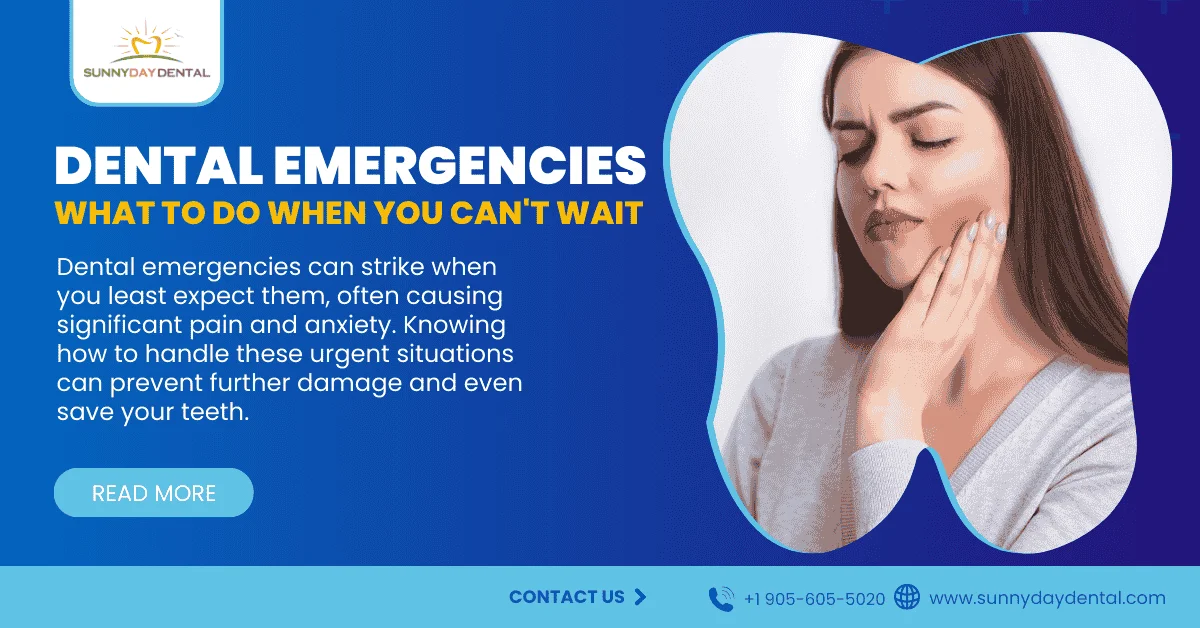Dental emergencies can strike when you least expect them, often causing significant pain and anxiety. Knowing how to handle these urgent situations can prevent further damage and even save your teeth. In this detailed guide, we’ll walk you through everything you need to know about emergency dental, how to manage them, and when to seek urgent dental treatment, especially if you’re looking for reliable emergency dental care in Woodbridge.
Table of Contents
ToggleUnderstanding Dental Emergencies
When it comes to dental emergencies, timing is everything. Ignoring or delaying treatment for a serious issue can lead to complications, infections, or even tooth loss. But what exactly constitutes an emergency dental?
It refer to any dental issue that requires immediate attention to relieve pain, stop bleeding, or prevent a serious infection. Not all dental problems require an urgent visit to the dentist, but knowing the difference can save you from unnecessary stress and expenses.
Common Symptoms of Dental Emergencies:
- Sudden, intense tooth pain that disrupts daily activities
- Swelling in the gums or face, which may indicate infection
- Bleeding that doesn’t stop after applying pressure
- Teeth that are dislodged, cracked, or broken
The key to handling a dental emergency effectively is understanding the severity of the situation and acting swiftly.
Signs You Need Urgent Dental Treatment
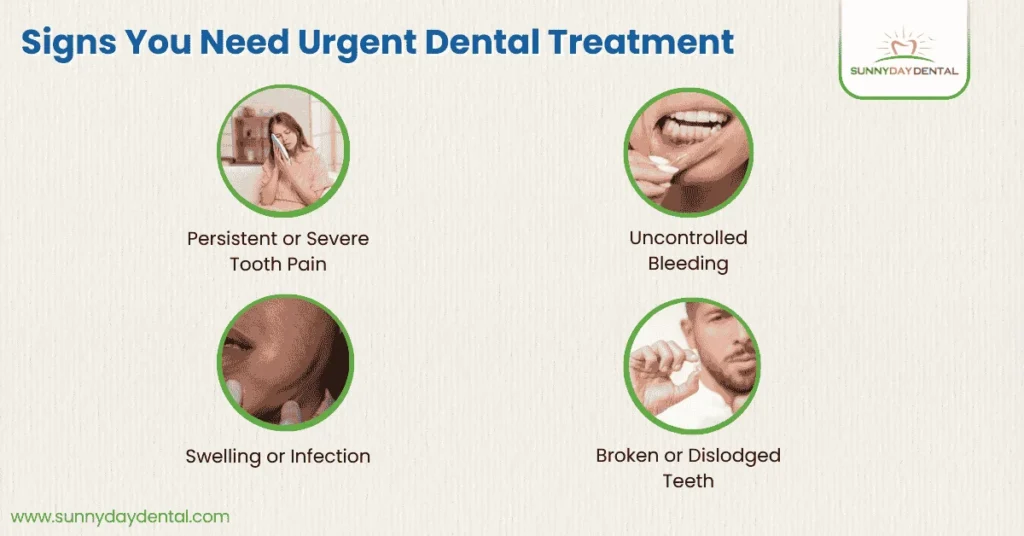
You might be wondering if your situation is serious enough to warrant urgent dental treatment. While some issues, like mild toothaches can wait, others need immediate attention. Below are some clear indicators:
1. Persistent or Severe Tooth Pain
- If over-the-counter painkillers don’t alleviate your pain, you may have a deep cavity, an abscess, or a cracked tooth that needs immediate attention. Pain is your body’s way of signaling that something isn’t right.
2. Swelling or Infection
- Swelling in the gums or face is a red flag, often indicating an abscess or other serious infection. Left untreated, infections can spread to other parts of your body, causing more severe health issues.
3. Uncontrolled Bleeding
- Bleeding from the gums or mouth that doesn’t stop with pressure could indicate a severe gum disease or trauma that needs to be addressed right away.
4. Broken or Dislodged Teeth
- Accidents or sports injuries can lead to broken or completely dislodged teeth. Acting quickly can often save the tooth, but time is of the essence.
By recognizing these symptoms early on, you can seek emergency dental care in Woodbridge to prevent further complications.
Common Types of Dental Emergencies
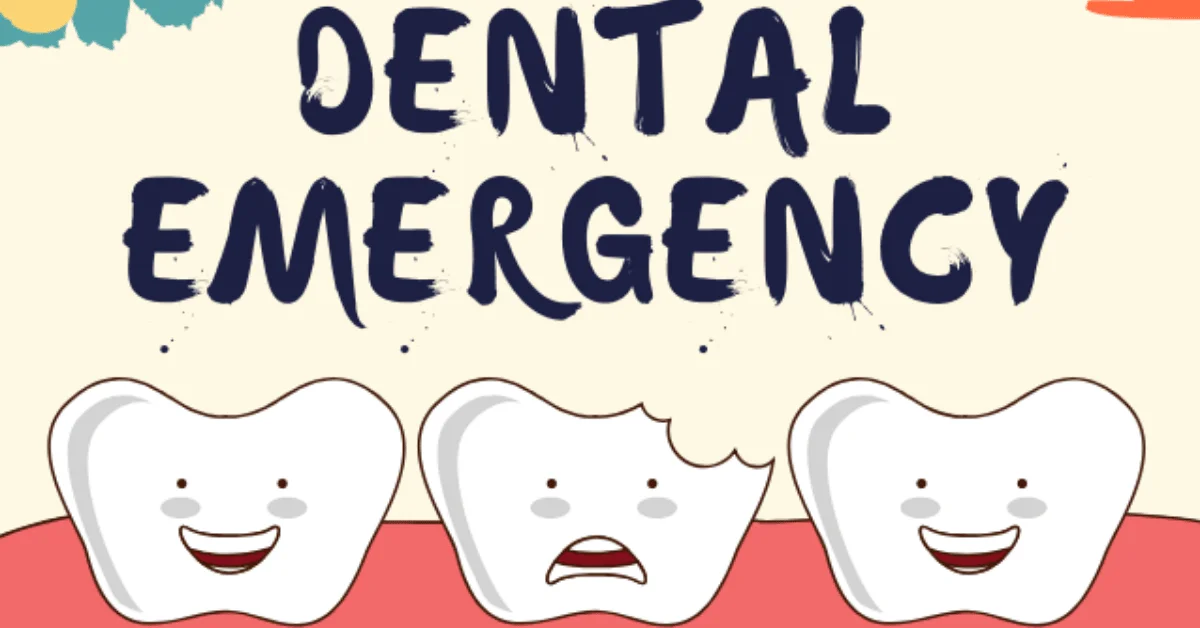
Now that we’ve established what constitutes a dental emergency, let’s explore some of the most common situations and their causes:
1. Severe Toothache
A sudden toothache can be caused by various issues, such as:
- Tooth decay or cavity: When decay reaches the inner layers of the tooth, it can cause intense pain.
- Gum disease: Inflamed gums can lead to pain that radiates throughout the jaw.
- Bacterial infections or abscesses can lead to swelling, discomfort, and even fever.
What to Do: Rinse your mouth with warm saltwater and take an over-the-counter painkiller. An abscess or bacterial infection may result in pain, swelling, and elevated fever.
2. Chipped or Cracked Tooth

Cracks or chips may occur from biting into something hard or experiencing an impact injury. Symptoms may include pain when chewing or sensitivity to temperature.
What to Do: Rinse your mouth with warm water, save any fragments if possible, and contact a dentist immediately for emergency dental care in Woodbridge.
3. Knocked-Out Tooth (Avulsed Tooth)
If a tooth is completely knocked out:
- Handle it by the crown (the top part) and avoid touching the root.
- Rinse it gently if dirty, but do not scrub.
- Try placing it back in the socket or store it in milk.
What to Do: Reach a dentist within 30-60 minutes for the best chance of re-implanting the tooth successfully.
4. Dental Abscess
An abscess is a serious condition where a pocket of pus forms due to infection. Symptoms include a swollen face, fever, and difficulty swallowing.
What to Do: This requires immediate professional care to prevent the infection from spreading. Do not attempt to drain the abscess yourself.
Step-by-Step Guide: How to Handle a Dental Emergency
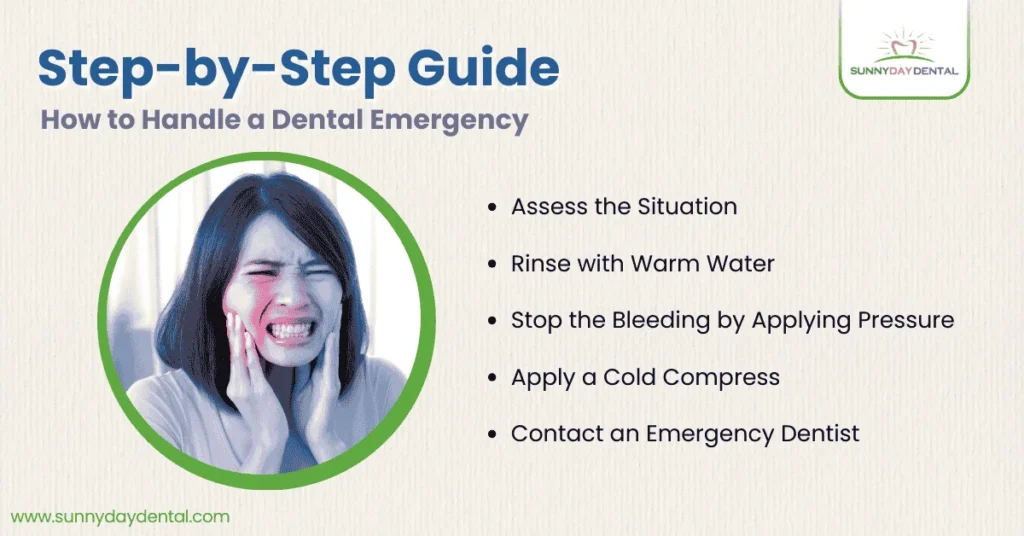
Facing a dental emergency can be overwhelming, but staying calm and following these steps can make a big difference:
- Assess the Situation: Determine if it’s a true emergency. Severe pain, swelling, or trauma often requires immediate care.
- Rinse with Warm Water: Cleaning the affected area can reduce bacteria and ease discomfort.
- Stop the Bleeding : By applying pressure with a clean cloth or gauze to the affected area.
- Apply a Cold Compress: Reduces swelling and numbs the area to alleviate pain.
- Contact an Emergency Dentist: If you’re in Woodbridge, call Sunny Day Dental for urgent dental treatment.
The Importance of Emergency Dental Care in Woodbridge
Access to reliable emergency dental care is crucial for residents in Woodbridge. Whether it’s a tooth knocked out during a sports game or a sudden toothache that flares up in the middle of the night, having a trusted local dentist can make all the difference. Sunny Day Dental offers flexible hours and immediate appointments to handle emergencies promptly.
Preventive Tips to Avoid Dental Emergencies
Although accidents aren’t always preventable, certain steps can help lower your risk:
- Practice Excellent Oral Hygiene: Brush your teeth twice daily, floss regularly, and use an antiseptic mouthwash.
- Wear Protective Gear: If you play sports, always wear a mouthguard.
- Avoid Hard Foods: Steer clear of ice, hard candies, and nuts that can crack teeth.
- Regular Dental Check-Ups: Regular visits can catch potential problems early on, preventing them from becoming emergencies.
Long-Term Implications of Ignoring Dental Emergencies
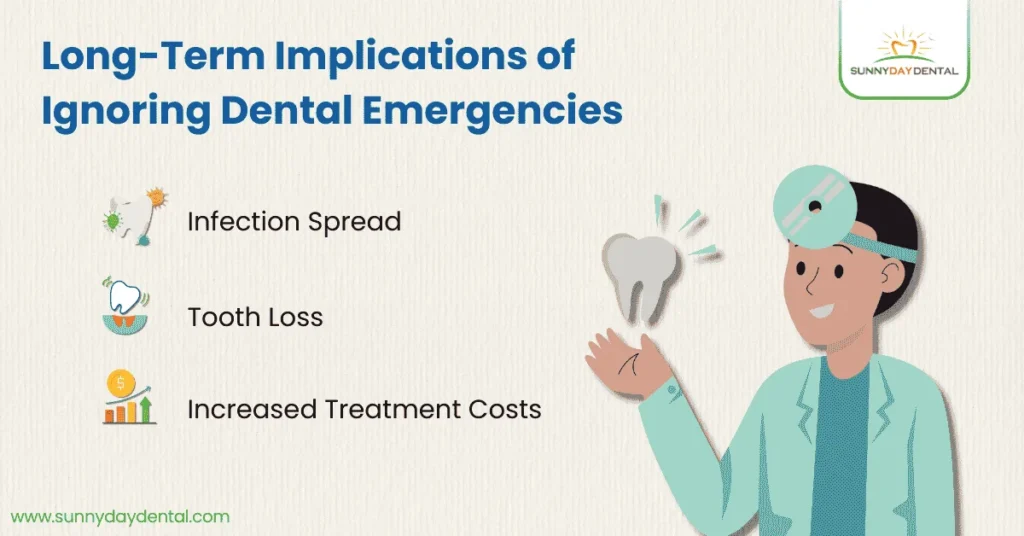
Ignoring dental emergencies can have severe consequences.
- Infection Spread: Untreated abscesses can lead to life-threatening conditions like sepsis.
- Tooth Loss: Delaying treatment for a knocked-out tooth decreases the chances of saving it.
- Increased Treatment Costs: The longer you wait, the more complex and expensive the treatment becomes.
What to Do if You Knock Out a Tooth
If a tooth gets knocked out, rinse it gently, try reinserting it into the socket, or store it in milk. See a dentist within 30 minutes to maximize the chance of saving the tooth.
Visit Sunny Day Dental in Woodbridge for immediate urgent dental treatment. Our skilled team is here to assist with all your dental emergencies.
Don’t wait for an emergency dental to escalate. Whether it’s a toothache, a broken tooth, or a knocked-out tooth, seeking timely emergency dental care in Woodbridge can make all the difference. At Sunny Day Dental, we’re committed to providing prompt, compassionate care to restore your smile. Call us today or visit sunnydaydental to book an emergency appointment.
FAQs
1. How can I tell if my dental problem is an emergency?
If you’re experiencing severe pain, bleeding, or swelling that doesn’t subside, or if a tooth has been knocked out, it’s best to contact a dentist immediately.
2. Can I wait to treat a chipped tooth?
Minor chips can wait, but if it’s causing pain or if a large portion is broken, seek dental care promptly to prevent further damage.
3. What should I do if my gums are bleeding excessively?
Bleeding gums can indicate gum disease or injury. Rinse with saltwater, apply gentle pressure, and consult a dentist if it persists.
4. How can I prevent tooth fractures?
Avoid chewing on hard objects, use a mouthguard during sports, and address grinding or clenching issues with your dentist.
5. Is it safe to use painkillers for dental pain?
Over-the-counter painkillers can provide temporary relief, but they won’t treat the underlying issue. Seek professional dental care for a proper diagnosis.

